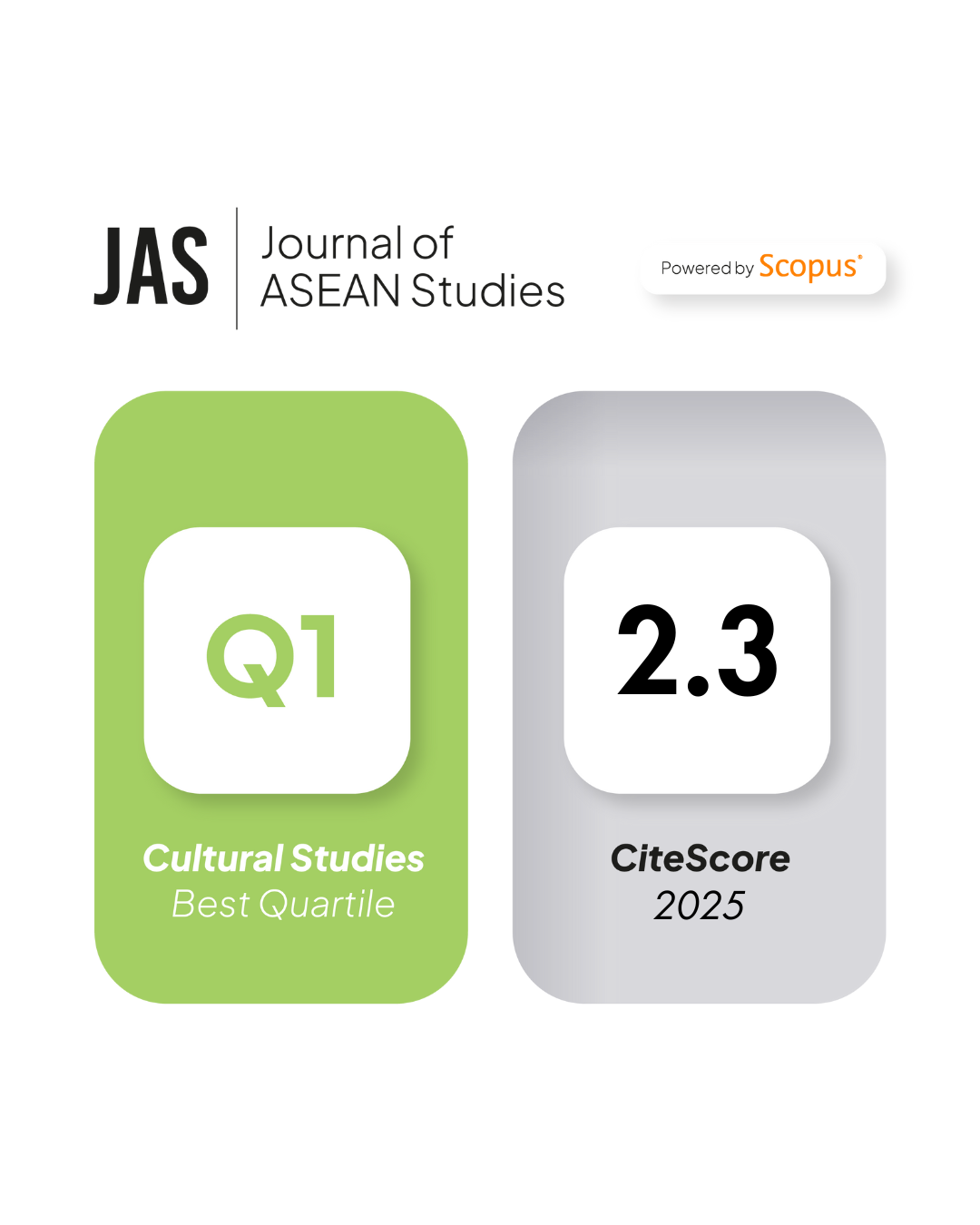Policing Cyberspace: Understanding Online Repression in Thailand and the Philippines
DOI:
https://doi.org/10.21512/jas.v8i2.6769Keywords:
cyberspace, algorithm, policing, online repression, self-censorshipAbstract
Social networking sites have become increasingly relevant in the study of democracy and culture in recent years. This study explores the interconnectedness of social networks, the imposition of state control, and management of social behavior by comparing various literature on the operation of repression in Thai and Philippine cyberspaces. It examines the overt and covert policing of daily interactions in digital environments and unpacks governmental technologies’ disciplinary mechanisms following Michel Foucault’s notion of government and biopolitical power. Subjugation in the context of social networks merits analysis for it sheds light on the practice of active and passive self-censorship—the former driven by the pursuit of a moral self-image and the latter by state-sponsored fear. In tracing various points of convergence and divergence in the practice of cyber control in Thailand and the Philippines, the study found newer domains of regulation of social behavior applicable to today’s democracies.
References
Benkler, Y. (2006). The Wealth of Networks: How Social Production Transforms Markets and Freedom. New Haven and London: Yale University Press.
Bevir, M. (1999). Foucault and critique: Deploying agency against autonomy. Political Theory, 27(1), 65-84. https://www.jstor.org/stable/192161
Brayne, S. (2017). Big data surveillance: The case of policing. American Sociological Review, 82(5), 977-1008. https://doi.org/10.1177/0003122417725865
Carlson, M. (2017). Facebook in the News. Digital Journalism, 6(1), 4-20. https://doi.org/10.1080/21670811.2017.1298044
Dean, M. (2010). Governmentality: Power and Rule in Modern Society (2nd Ed.). London: Sage Publications Ltd.
Facebook shows posts of banned accounts in Thailand. (2019, July 26). Bangkok Post.
Feldman, G. (2012). The Migration Apparatus: Security, Labor, and Policymaking in the European Union. California: Stanford University Press.
Felluga, D. F. (2015). Critical Theory: The Key Concepts. Oxon and New York: Routledge.
Foucault, M. (1978). The history of sexuality. New York: Pantheon Books.
Foucault, M. (1978/2001). Questions of method. In P. Rabinow & J. D. Faubion (Eds.), Essential works of Foucault, 1954-1984 (Volume 3, pp. 223-238). New York: New Press.
Foucault, M. (1981). Omnes et singulatim: Towards a criticism of “political reason”. In S. McMurrin (Ed.), The Tanner Lectures on Human Values II, (pp. 223-254). Salt Lake City: University of Utah Press.
Foucault, M. (1982/2001). The subject and power. In P. Rabinow & J. D. Faubion (Eds.), Essential works of Foucault, 1954-1984 (Volume 3, pp. 326-348). New York: New Press.
Foucault, M., Senellart, M., Ewald, F., & Fontana, A. (1983/2007). Security, territory, population: Lectures at the Collège de France, 1977-1978. New York, N.Y: Picador/Palgrave Macmillan.
Frechette, J. (2005). Cyber-democracy or cyber-hegemony? Exploring the political and economic structures of the internet as an alternative source of information. Library Trends, 53(4), 555-575. https://www.ideals.illinois.edu/handle/2142/1748
Geiger, S. R. (2009). Does Habermas understand the Internet? The algorithmic construction of the blogo/public sphere. Gnovis: A Journal of Communication, Culture, and Technology, 10(1), 1-29. https://escholarship.org/uc/item/60s6s0p8
Gillmor, D. (2004). We the media: The rise of citizen journalists. National Civic Review, 93(3), 58-63. https://doi.org/10.1002/ncr.62
Gleicher, N. (2019, October 21). How we respond to inauthentic behavior on our platforms: policy update. Facebook. https://about.fb.com/news/2019/10/inauthentic-behavior-policy-update/
Grossman, L. K. (1995). The Electronic Republic: Reshaping Democracy in the Information Age. New York: Viking.
Habermas, J. (2006). Political communication in media society: Does democracy still enjoy an epistemic dimension? The impact of normative theory on empirical research. Communication Theory, 16, 411-426. https://doi.org/10.1111/j.1468-2885.2006.00280.x
Hearn, A. (2010). Structuring feeling: Web 2.0, online ranking and rating, and the digital “reputation” economy. Ephemera: Theory and Politics in Organization, 10, 421-438.
Johnson, A. (2014). Foucault: Critical theory of the police in a neoliberal age. Theoria, 141(61), 5-29. https://doi.org/10.3167/th.2014.6114102
Laungaramsri, P. (2016). Mass surveillance and the militarization of cyberspace in post-coupThailand. ASEAS – Austrian Journal of South-East Asian Studies, 9(2), 195-214. https://doi.org/10.14764/10.ASEAS-2016.2-2
Lemke, T. (2002). Foucault, governmentality, and critique. Rethinking Marxism: A Journal of Economics, Culture and Society, 14(3), 49-64. https://doi.org/10.1080/089356902101242288
Maboloc, C. R. (2018). The radical politics of nation-states: The case of President Rodrigo Duterte. Journal of ASEAN Studies, 6(1), 82-96. https://doi.org/10.21512/jas.v6i1.4458
Maboloc, C. R. (2019). The predatory state and radical politics: The case of the Philippines. Journal of ASEAN Studies, 7(2), 161-175. https://doi.org/10.21512/jas.v7i2.6163
Macnamara, J. (2008). Internet media and the public sphere: The 2007 Australian e-electioneering experience. Media International Australia, 129(1), 7-19. https://doi.org/10.1177/1329878x0812900103
Mahlouly, D. (2013). Rethinking the public sphere in a digital environment: Similarities between the eighteenth and the twenty-first centuries. eSharp, 20. https://www.gla.ac.uk/media/media_279211_en.pdf
Mill, J. S. (2003). On Liberty. Binghamton, New York: Vail-Ballou Press.
Norris, C. (2008). Video charts: Algorithmic surveillance. Criminal Justice Matters, 20(1), 7-8. https://doi.org/10.1080/09627259508552710
Ong, J. C. and Cabañes J. V. (2018). Architects of Networked Disinformation: Behind the Scenes of Troll Accounts and Fake News Production in the Philippines. Leeds, UK: The Newton Tech4Dev Network.
Ong, J. C. and Cabañes J. V. (2019). When disinformation studies meet production studies: Social identities and moral justifications in the political trolling industry. International Journal of Communication, 13, 5771-5790. https://ijoc.org/index.php/ijoc/article/view/11417/2879
Patton, M. Q. (2005). Qualitative research. Encyclopedia of Statistics in Behavioral Science. https://doi.org/10.1002/0470013192.bsa514
Ramasoota, P. (2016). Online social surveillance and cyber-witch hunting in post-2014 coup Thailand. In C.B. Wungaeo, et al. (Eds.), Globalization and Democracy in Southeast Asia (pp. 269-288). United Kingdom: Palgrave Macmillan.
Rheingold, H. (2000). The Virtual Community: Homesteading on the Electronic Frontier. Cambridge: MIT Press.
Schaffar, W. (2016). New social media and politics in Thailand: The emergence of fascist vigilante groups on Facebook. ASEAS – Austrian Journal of South-East Asian Studies,9(2), 215-234. https://doi.org/10.14764/10.ASEAS-2016.2-3
Sinpeng, A. (2013). State repression in cyberspace: The case of Thailand. Asian Politics & Policy, 5(3), 421-440. https://doi.org/10.1111/aspp.12036
Sombatpoonsiri, J. (2017, July 26). As Thailand restricts internet freedom, cyber activists work to keep an open web. The Conversation. https://theconversation.com/as-thailand-restricts-internet-freedom-cyber-activists-work-to-keep-an-open-web-80911
Sombatpoonsiri, J. (2018). Manipulating civic space: Cyber trolling in Thailand and the Philippines. Giga Focus Asia, 3, 1-11. https://www.giga-hamburg.de/en/publication/cyber-trolling-in-thailand-and-the-philippines
Thorson, K. (2014). Facing an uncertain reception: Young citizens and political interaction on Facebook. Information, Communication & Society, 17(2), 203-216. doi:10.1080/1369118x.2013.862563
Tufekci, Z. (2015). Algorithmic harms beyond Facebook and Google: Emergent challenges of computational agency. Colorado Technology Journal, 13, 203-218. http://ctlj.colorado.edu/wp-content/uploads/2015/08/Tufekci-final.pdf
Valtysson, B. (2012). Facebook as a digital public sphere: Processes of colonization and emancipation. tripleC: Communication, Capitalism & Critique, 10, 77-91. https://doi.org/10.31269/triplec.v10i1.312
Vatsov, D. (2018). Logics of propaganda. Critique & Humanism: Journal for Human and Social Studies, 49(1), 71-106. https://hssfoundation.org/wp-content/uploads/2017/04/all-KX-49-print.pdf
Who benefited most from fake news, and other questions, answered in three charts. (2017, 22 December). VERA Files. http://verafiles.org/articles/vera-files-yearender-who-benefited-most-fake-news-and-other
Downloads
Published
How to Cite
Issue
Section
License
Copyright (c) 2020 Fernan Talamayan

This work is licensed under a Creative Commons Attribution-NonCommercial 4.0 International License.


























